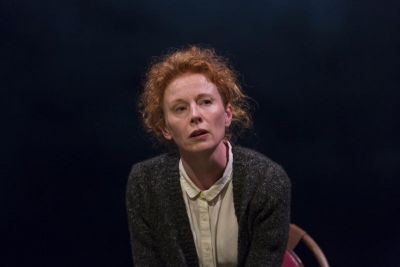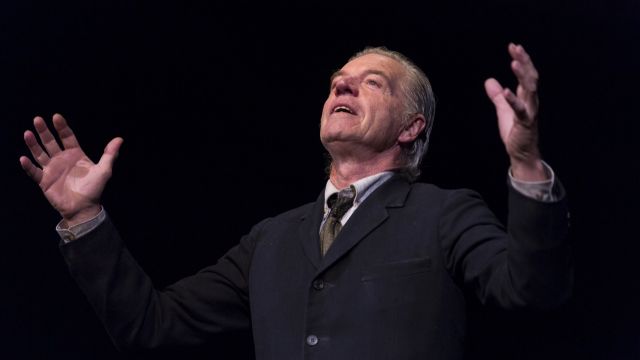Faith Healer
Before last night, if you had asked me if I would enjoy a night out listening to four monologues, I may well have yawned and politely declined. State Theatre Company South Australia’s Belvoir production of Faith Healer, with its powerful, seemingly simple and beautifully staged storytelling has changed all that.
Irish playwright, Brian Friel’s play, is a masterclass in multiple aspects of theatre. Well-respected theatre doyen, Judy Davis, directs with the keen eye of a skilled actor, building multiple themes, tension, compassion and desolation with controlled movement, simple staging and an obvious respect for the creative strength the three actors who tell this story bring to their roles. At all times, all of the elements; performance, lighting, staging, costumes and sound interweave and bring together two hours of unexpectedly riveting and engrossing theatre.
This is not a version of Burt Lancaster’s powerful portrayal of Elmer Gantry. It is the poignant story of an unfulfilled life that haunts and taunts and irrevocably shapes the lives of others who grudgingly love him and are caught in his thrall. Heartbreak replaces glitz and relentless poverty replaces the stardom of tent healing as we have often known it. It is also a story of home-coming and recognition that was never quite achieved.
The premise is simple. Frank Hardy is a faith healer who barely scrapes by, and indeed, often does not. Colin Friels as an actor, is a miracle worker. His portrayal of Frank Hardy, who devotes himself to healing the sick and helping the poor, marries warmth, wit and desperation. He is charismatic, brutally selfish, hopelessly deluded about the realities of his relationships, yet warm and optimistic about what he can potentially do for others.

Frank Hardy is presented to the audience as “down at heel”. He is not a man of means. His clothes are a tired dusty black, a little too small, a little too short and somewhat ragged. His shoes are scuffed and well worn. His hands, those of a healer, are large, exposed and draw the eye of the audience.
The entire story is told by the actors in the past tense and Friels is compelling from the first word. His Frank Hardy admits to the “pompous struttings of a young man”, unsure of his powers. He is a man who spent a lifetime silencing his inner demons with whisky.
Friels’ mastery of accent is notable and beguiling as his cadence endears the audience to an Irishman who also flawlessly recites Welsh village names and mimics his manager, Teddy’s broad convivial Cockney accent and style of speaking.
It is no mystery that Alison Whyte, as his mistress (never wife, she tells us), Gracie, has been nominated for a Helpmann Award for her performance in this role. The audience meets Gracie as an insecure and damaged woman, using weekly top ups of pills and endless drinking of whisky as a crutch to deal with what seems to be a complex and difficult life. We are steadily exposed to the torturous existence that she faced and endured as the woman who both gave and lost her all to Frank through “the depravity of their lives”. Crouched on the stage, prone and bearing her soul and her misery, the audience hears another version of their lives. Their stories dovetail, but the lenses are blurred and vastly differently focussed.
 Paul Blackwell as Frank’s manager, Teddy brings a valuable comedy element that is also deeply poignant. Teddy chats conversationally to the audience, punctuating another version of the same events with humour and sardonic reflection. The role appears less well written, perhaps highlighting the unbreakable interdependence of Frank and Gracie’s lives and stories. As Teddy, Blackwell tells stories about “the talent” being business but not friends; stories that are well-developed as he chats about all sorts of artists, but veers sharply into the reality of his love for both Gracie and Frank and revealing some of the saddest and most desperate times that they all shared.
Paul Blackwell as Frank’s manager, Teddy brings a valuable comedy element that is also deeply poignant. Teddy chats conversationally to the audience, punctuating another version of the same events with humour and sardonic reflection. The role appears less well written, perhaps highlighting the unbreakable interdependence of Frank and Gracie’s lives and stories. As Teddy, Blackwell tells stories about “the talent” being business but not friends; stories that are well-developed as he chats about all sorts of artists, but veers sharply into the reality of his love for both Gracie and Frank and revealing some of the saddest and most desperate times that they all shared.
Brian Thomson’s set uses simple props and a cyclorama backdrop where Verity Hampson has skilfully lit actors and clouds, signalling changing times, moods and situations. Paul Charlier’s sound is often muted, rising to create time and effects, underlining and punctuating the dialogue.
Bathed in the light of a new beginning, Faith Healer’s tale ends.
Have a little faith and see this example of theatre at its best.
Jude Hines
Images: Colin Friels and Alison Whyte (photographer Brett Boardman) and Paul Blackwell (photographer Jeff Busby).
Subscribe to our E-Newsletter, buy our latest print edition or find a Performing Arts book at Book Nook.

